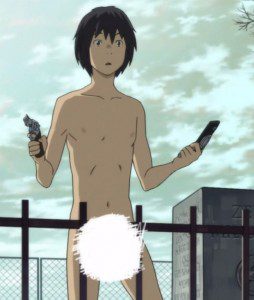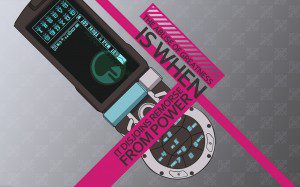 Hypothetical situation for you: say you woke up one day, naked, in the middle of Washington DC…in front of the White House of all places. All you have on you is a gun and a weird mobile phone. You also have no idea who you are. How would you react? Would you run and hide? Would you check the phone for information? Would you use the gun?
Hypothetical situation for you: say you woke up one day, naked, in the middle of Washington DC…in front of the White House of all places. All you have on you is a gun and a weird mobile phone. You also have no idea who you are. How would you react? Would you run and hide? Would you check the phone for information? Would you use the gun?
These questions are all part of the setup behind “Eden of the East,” one of 2009’s smash titles that takes the above scenario and throws the viewer into a story of intrigue, suspense, political action, morality and the desire to “save the world.” It also asks a lot more questions than “what would you do?” and ends with a literal bang.

I came late to this particular party, as most of my friends had already seen the series and had been hyping it up to me for quite some time. And since I was staring down the barrel of a 9 hour train ride last month, I figured it would be a good time to try to get through as much of the series as possible. This was both a good, and horrid, idea in the end. Good in that I finally had a chance to experience this well-paced, well drawn series. Horrid in that I had so much philosophy poured into my head at once, it took me a week to recover.
“Eden” is told through the eyes of two characters: Akira Takaizawa, the aforementioned boy who wakes up naked with a gun and phone, and no memories to boot, and has to figure out how he came to Washington, why he was there in the first place, and what’s the deal with this phone he suddenly has with 10 billion yen on it, and the instructions to “Save Japan.” On the other side of the story, a young girl, Saki Morimi, recent college graduate on a trip to the United States to celebrate her adulthood, finds Takizawa and is herself drawn into the intrigue and suspense that surrounds the boy and his involvement with the “Selecao” project. (A clever use of the Portuguese word meaning “Selection.”)

This is a VERY bare bones description of the opening episode. The story, which unfolds over 11 episodes and 2 movies, throws the characters into a world far deeper and meaningful than they could ever have known. How did Takizawa lose his memories? Who are the other Selecao? Why was he chosen to undertake this mission? How is he supposed to save Japan? And will Saki ever get a job? are all major plotlines in the series. Saki herself is more of a “silent observer” to the entire thing, as she rarely influences the story outside of causing Takizawa confusion and motivating him in the end. The action centers around Takizawa and his amazing phone, with all the responsibilities ensuing from owning it.

One thing that struck me about the series was the overt imagery and symbolism that runs through the story. While on the surface, “Eden of the East” is a morality play revolving around obligation and duty, underneath lurks questions about the nature of humanity. After all, while Takizawa is told he has to save Japan with the 10 billion yen in his phone, he also can ask “Juiz,” (“Judge,” you clever writer, you) his aural concierge, to use that money for anything, be it buying a shopping mall or asking the Prime Minister to say random things during a press conference. The fact that these “chosen” have such freedom begs the question “How does one save Japan? Is there even a correct answer?” Of course, in the eyes of the entity who set up the project (the aptly named Mr. Outside) there is, and he exudes his will through the Selecao chosen to role of the “Supporter,” whose goal is to remove from play any Selecao who run out of money, or who spend it selfishly. And yet, there exist Selecao who work outside the boundaries of even the “Supporter,” and those who do noble things, and are removed from the game anyway. The idea of right and wrong, duty and personal ambition, are explored wonderfully throughout the story. While not quite a god himself, Mr Outside is often shown to be powerful, possibly omnipotent, and possibly even selfless, if his desire to “save Japan” is actually motivated by the goodhearted need to save the world and not as just another game.

Also of note, the idea of the NEET, and their role within Japanese society. Unfamiliar to the West at large, this term actually means “Not in Education, Employment or Training,” and refers to those who willfully forego the responsibilities of the modern world in favor of living in their own fantasies and desires. Within the nation of Japan, this is synonymous with the idea of hikikomori, the rejection of the outside world, and is seen as a real threat to national stability and the advancement of Japanese culture. “Eden” explores this phenomenon, showing that the NEETs not only do serve a purpose, but also are capable of great things. However, it also portrays certain NEETs as a bit sub-human, withdrawn into a world dominated by personal desires (at best) to devolution into animalistic behavior (at worst). The connections between Takizawa in relation to the idea of the NEET are both sympathetic and accusatory, and the series makes no effort to hide or gloss them over, rather laying them out in stark contrast. For those unfamiliar, this is a frank look into a prevalent issue within modern Japan, and an illuminating one at that.
Some have said that the series is too short. And it is. Eleven episodes, for a story this deep, is clearly not enough to tell a tale that the creators intended. At the same time, it also never really bogs itself down. Some have also said that the show declines after the “hotel room,” which I suppose it does, but I still loved it anyway. Shortcomings aside, “Eden of the East” is very satisfying. It is beautiful to look at, the charisma possessed by, and between, Takizawa and Saki enriches the interactions and truly feels like a motivation for the story to proceed. At the very least, the metaplots involving intrigue between the Selecao, the self-righteous actions of certain OTHER Selecao and the absolutely amazing ending, all make “Eden of the East” worth watching. After all, its only 11 episodes in the end. The perfect show for a lazy afternoon…or a 9 hour train ride.



uh, there are two full length films that pretty much wrap up the story!! the first one is “The King Of Eden” and the second/final film is “Paradise Lost”
both were very well made and satisfyingly end the story!!yo should peep ’em
peace!!